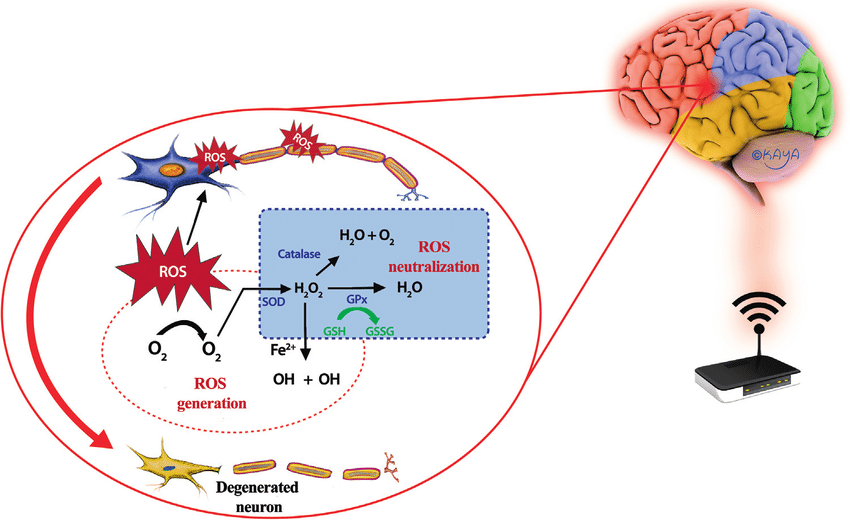Table of Contents
- The Competitive Race to “De-Age”: Tackling Anti-Aging and Oxidative Stress
- Epigenetics Unveiled: A Key Player in Anti-Aging
- Combatting Electromagnetic Stress: Strategies for a Healthier Life
- Decoding the Science: EMFs, Oxidative Stress, and the Aging Process
- Making Informed Decisions in the Age of Anti-Aging Technology
- Your Ally Against EMF-Related Oxidative Stress: Discover Aires Tech
- See You on the Next Wave: Embracing Future Anti-Aging Innovations
In a world obsessed with staying young and vibrant, the pursuit of anti-aging has become the latest hype. Billionaire tech entrepreneurs and everyday people alike seek to slow aging and preserve youth. What fuels this anti-aging obsession? What secrets lie in the pursuit of eternal youth? Today, we examine the mass appeal of anti-aging and the role of EMFs in aging and oxidative stress.
The Competitive Race to “De-Age”: Tackling Anti-Aging and Oxidative Stress
Tech millionaire Bryan Johnson initiates the Rejuvenation Olympics, a stunning show of wealth and rivalry. This online leaderboard allows participants to compete not on physical abilities, but on their ability to slow their “biological age.” They compete to be the top Benjamin Button, aiming to age at the slowest rate achievable. The catch? The competitors never cross the finish line; their goal is perpetual youthfulness.
Contenders like celebrities Steve Aoki and biohacker Ben Greenfield obsess over every minutia of their lifestyles. They meticulously adjust their diets, engage in physical activity, and regularly test their biological age. But Johnson takes it to a different level altogether. He eats 70 pounds of vegetables monthly, gets blood transfusions from his son, and uses a red-light hair growth cap. These eccentric habits, typical in Silicon Valley’s ultra-rich, show the lengths people go for health and longevity.
Obsession with Aging Backwards
Beyond the Rejuvenation Olympics, the pursuit of anti-aging has attracted immense investment from billionaires and tech founders. In recent years, more than $5 billion has poured into longevity-related companies worldwide. Amazon’s Jeff Bezos and Twitter’s Jack Dorsey back startups like Altos Labs and Unity Biotechnology for life extension. OpenAI’s Sam Altman invested $180 million in Retro Biosciences, aiming to extend the human lifespan by a decade.
Hubris or Hope?
With the abundance of investment and hype surrounding anti-aging, it is crucial to distinguish between genuine breakthroughs and snake oil. Science progresses in epigenetics and gene expression, yet fully reversing age is contentious. Experts warn against believing overhyped claims.
Epigenetics Unveiled: A Key Player in Anti-Aging
Epigenetics explores gene expression influenced by environment and lifestyle, aiding in understanding aging. Epigenetic age testing reveals one’s biological age through gene patterns. Remember, biological age differs from chronological age; lifestyle greatly affects the aging rate.
Embracing the Journey to Health
Reversing age may be sci-fi, but anti-aging research enhances health understanding. This motivates positive lifestyle changes to slow aging and improve well-being.
The quest for eternal youth, from Rejuvenation Olympics to billionaire-backed startups, is a new frontier. While total age reversal is elusive, epigenetics and healthy lifestyles hold vibrant prospects. Embrace self-care for a long, prosperous life.
Combatting Electromagnetic Stress: Strategies for a Healthier Life
Anti-aging captivates the world, actively merging modern science and age-old wisdom to slow down aging. Now, let’s explore the effective and affordable anti-aging methods we know, offering keys to sustainable wellness.
Nourish from Within
The adage “you are what you eat” couldn’t be more accurate when it comes to anti-aging. A diet rich in nutrient-dense foods can do wonders for your skin, energy levels, and overall well-being. Emphasize fruits, vegetables, whole grains, and lean proteins while minimizing processed foods and excessive sugar intake. Antioxidant-rich foods like berries, leafy greens, and dark chocolate combat free radicals, reducing cellular aging.
Get Moving
Regular physical activity does more than just keep you fit – it can turn back the clock on aging. Exercising moderately for at least 150 minutes weekly reduces chronic disease risk, enhances cardiovascular health, and boosts cognitive function. Exercise promotes the production of endorphins and growth factors, which contribute to a youthful appearance and enhanced well-being.
Prioritize Sleep
Quality sleep is crucial for rejuvenation and anti-aging. During sleep, the body repairs and regenerates cells, and the production of growth hormone peaks. Aim for 7 to 9 hours of uninterrupted sleep each night, ensuring a conducive sleeping environment free from disruptive factors like excess light and electronic devices. Establishing a consistent bedtime routine can help improve sleep quality and promote anti-aging benefits.
Stress Less
Chronic stress is not only detrimental to mental health but also accelerates the aging process. Long-term stress leads to increased cortisol levels, a hormone that can contribute to inflammation, impaired immune function, and premature aging. Incorporate stress-management techniques such as mindfulness meditation, yoga, or engaging in hobbies to reduce stress levels and promote a more youthful disposition.
Protects Against Environmental Stressors
In our increasingly connected world, electromagnetic fields (EMFs) from electronic devices surround us. Studies have shown that excessive exposure to EMFs may have adverse health effects, including accelerated aging. To protect yourself from the harmful effects of EMFs, consider using EMF protection devices and implementing smart habits such as keeping your distance from electronic devices, using speakerphone or wired headsets, and limiting screen time.
Hydrate, Inside and Out
Proper hydration is essential for maintaining youthful skin and overall health. Drinking an adequate amount of water each day helps to flush out toxins, keep the skin plump and moisturized, and promote a youthful glow. Additionally, using high-quality moisturizers and applying sunscreen daily can protect the skin from UV damage, preventing premature aging and maintaining a youthful appearance.
Decoding the Science: EMFs, Oxidative Stress, and the Aging Process
A study by Kivrak et al. published in 2017 delves into the mechanism of how EMF radiation could interfere with our antioxidant defense system, and potentially contribute to aging.
Background:
As we’ve explored, Electromagnetic fields (EMFs) are emitted from natural and man-made sources, and exposure to EMFs is common due to the widespread use of electronic devices in daily life. Previous research has suggested that EMF exposure can lead to detrimental effects on human health, including disrupted antioxidant defense systems and oxidative stress. Oxidative stress can cause cellular damage that has been linked to various age-related diseases, including cancer and diabetes. This study aimed to investigate the potential link between EMF exposure and the antioxidant defense system, and the resulting increase in oxidative stress that may contribute to aging. Read more here on oxidative stress & brain health.
EMF Exposure and Its Impact on Oxidative Stress: A Scientific Perspective
Researchers conducted a study on 75 male rats, dividing them into three groups. The control group had no EMF exposure. The second group faced 30 minutes of 900MHz EMF daily for 60 days. The third group, after similar EMF exposure, had a 7-day recovery period. Post-exposure, scientists assessed oxidative stress by measuring liver and brain MDA and TOS levels. They also measured antioxidants like GSH, catalase, and SOD activity.
Electromagnetic Radiation’s Role on the Central Nervous System and Oxidative Stress

“The role of EMF emitted from several devices, depicting an increase in the generation of ROS (reactive oxygen species) and consequent oxidative stress in the central nervous system resulting from the inability of the antioxidant defense system to cope with this increase in ROS.”
Image Source: Research Gate
Results:
The results revealed that exposure to the EMF increased oxidative stress in the brain and liver tissues and altered the antioxidant defense mechanisms. The results showed that EMF exposure increased oxidative stress in brain and liver tissues, altering antioxidant defenses. The EMF group had significantly higher MDA and TOS levels than the control and recovery groups. Enzymatic antioxidants like SOD, CAT, and GPx decreased in the EMF group, along with non-enzymatic GSH. However, the recovery group significantly improved in antioxidant activity compared to the EMF group, but not to the control group. Interestingly, the recovery group showed a significant improvement in antioxidant system activity compared to the EMF group, but not to the control group.
Discussion:
The study demonstrated that EMF exposure increases oxidative stress in the brain and liver tissue samples and disrupts the antioxidant defense system. The increase in oxidative stress was caused by the EMF-induced free radical generation, which overwhelmed the antioxidant defense mechanisms of the rats. The decrease in enzymatic and non-enzymatic antioxidant activities in the EMF group can cause damage to cellular structure, DNA, and proteins, accelerating the aging process and leading to the development of various age-related diseases. The results of this study support the need for protective measures against excessive EMF exposure and highlight the importance of maintaining a healthy antioxidant defense system to mitigate the potentially harmful effects of oxidative stress. Read more here on oxidative stress & fertility.
Making Informed Decisions in the Age of Anti-Aging Technology
Concerns over the potential health risks of electromagnetic fields (EMFs) have sparked many debates over the years. Focusing on valuable insights into the potential link between EMFs and aging is important while focusing on evidence-based scientific research.
Understanding the Myths:
- There are many myths about EMFs and their impact on aging, with many worrying that EMFs can contribute to faster aging and cognitive decline.
- However, This study found no conclusive evidence that long-term RF-EMF exposure contributes to significant oxidative stress or neuroinflammation in the aging brain.
Importance of Research:
- Advancements in scientific research are key to offering a deeper understanding of the impact of EMFs on health.
- Evidence-based research helps to dispel misinformation and promote informed decision-making concerning EMF exposure.
Your Ally Against EMF-Related Oxidative Stress: Discover Aires Tech

As we’ve explored the intricate relationship between EMF exposure, oxidative stress, and aging, it’s clear that proactive steps are essential in maintaining our youth and vitality in today’s high-tech world. Here at Aires Tech, we are committed to being part of your journey towards healthier living.
Our range of products is specifically designed to counteract the negative effects of EMFs, aligning perfectly with your anti-aging and wellness goals. By integrating Aires Tech solutions into your daily life, you’re taking a powerful step towards minimizing oxidative stress and supporting your body’s natural aging process.
Embrace the future with confidence and take control of your health in the EMF era. With Aires Tech, you’re not just using technology; you’re harnessing it for a healthier, more vibrant you.
Discover more about how our products can be a part of your anti-aging strategy here on The Wave. Let’s navigate this journey together, towards a life where technology enhances, not hinders, our well-being.
See You on the Next Wave: Embracing Future Anti-Aging Innovations
Diving into the world of anti-aging, especially with the backdrop of EMFs and oxidative stress, it’s like opening a Pandora’s box of science and lifestyle choices. Epigenetics is a game-changer here, showing us how our daily habits can change the way our genes work. It’s pretty empowering to think that what we eat, how we move, and even how we deal with stress can affect our aging process.
But let’s not forget about the tech all around us. Those invisible EMFs from our gadgets might be doing more than we think in terms of aging. Research points to a link between EMF exposure and increased oxidative stress, which is our bodies getting rustier and faster. So, what do we do? It’s not about ditching all our devices; it’s about smarter, more informed choices. Using tech wisely, shielding ourselves from too much EMF, and backing this up with a lifestyle that boosts our body’s natural defenses – that’s the way to go.

